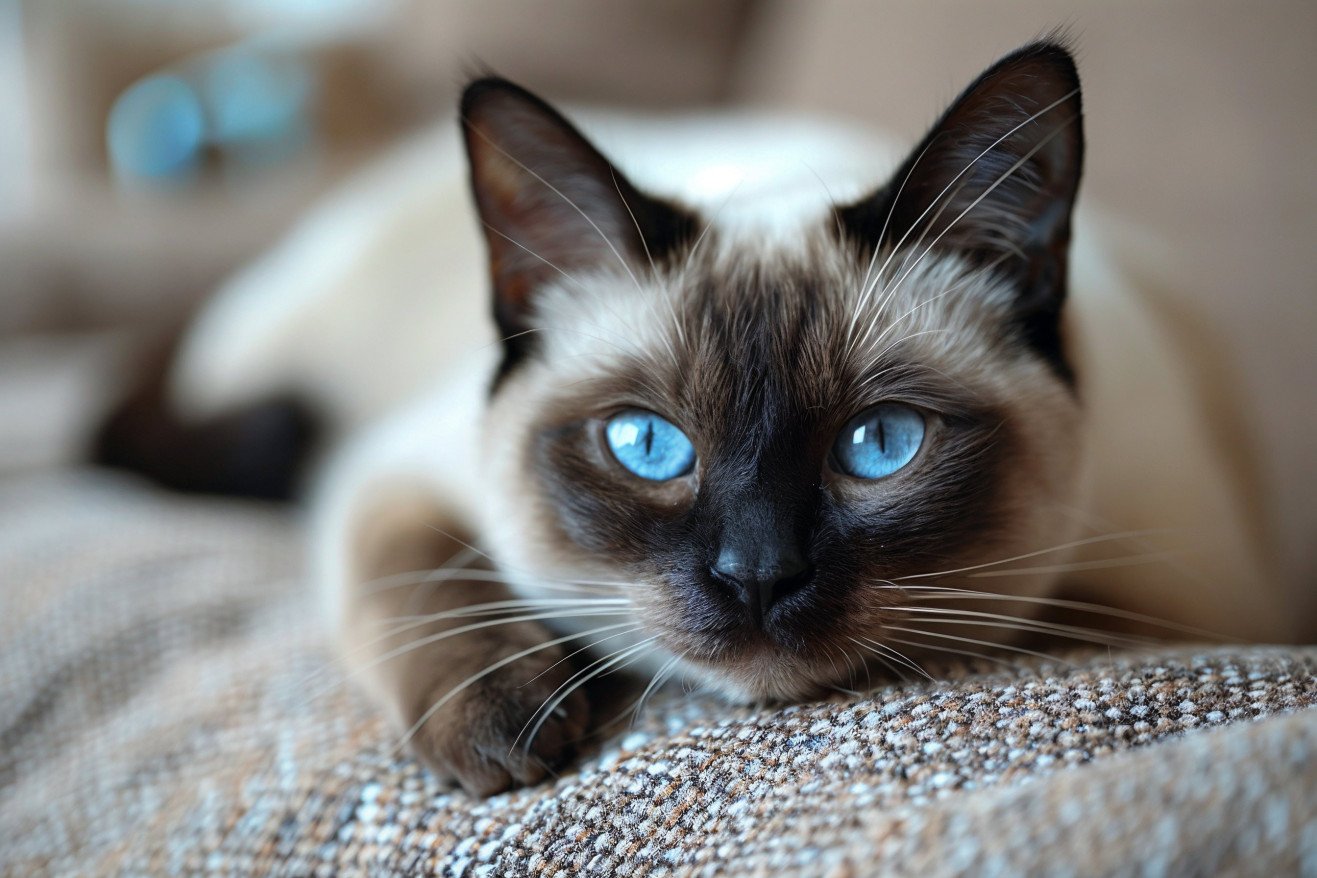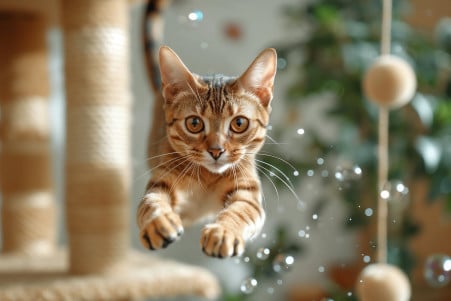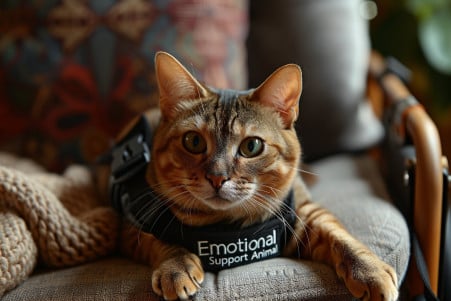Do Cats Get Bipolar Disorder? A Look at Feline Mental Health
7 April 2024 • Updated 5 April 2024

Although bipolar disorder is a mental health condition that is usually associated with people, recent studies have asked the question of whether our pet cats can also experience similar mood swings. The idea of bipolar disorder in cats is controversial, and there is little scientific evidence to prove that cats actually have the condition. However, many researchers and veterinarians believe that cats can have symptoms that are similar to mania and depression, but that these symptoms are often caused by other medical conditions or stress.
This article will look at the research that has been done on this topic, drawing on evidence from veterinary medicine, animal behavior research, and personal stories. It will provide a well-rounded view of whether or not cats can actually experience bipolar-like symptoms or if their mood changes can be explained by other, more physical or psychological factors. This will help you better understand your cat's mental health and happiness, and help you take better care of your pet.
Can cats be bipolar?
Causes and Triggers of Dysthymia in Cats
Dysthymia, or persistent depressive disorder, is a condition that some experts believe may affect cats. According to research cited by MiauStore, causes of dysthymia in cats may include genetics, hormonal imbalances, environmental factors, stress, and lack of stimulation. The article also suggests that certain breeds, such as Abyssinians, may be more susceptible to mood disorders.
In addition to these potential causes, there are a number of potential triggers for dysthymic behaviors in cats. According to the ASPCA, potential triggers for depression and anxiety in cats include major life changes, such as the introduction of a new family member, moving to a new home, construction noise, or even a new collar. In addition, PetMD notes that underlying health issues, such as pain, illness, or neurological conditions, can also play a role in mood disturbances.
While the idea of true bipolar disorder in cats is controversial, cats can certainly experience emotional highs and lows that affect their behavior and well-being. This makes it important to understand the potential triggers for these conditions so that you can provide the best care and support for your pet. This knowledge will also help you better understand how to identify and address problematic behaviors that may be a sign of emotional distress.
How to Recognize and Treat Bipolar-Like Behavior in Cats
Recognizing the signs of bipolar-like behavior in cats is the first step in helping your pet get the care they need. NeuroLaunch lists sudden mood changes, including aggression followed by withdrawal, as a symptom of bipolar-like behavior. The organization also says that cats with bipolar-like behavior may have periods of restlessness and hyperactivity followed by periods of inactivity, lethargy, and a lack of appetite.
Diagnosing bipolar-like behavior in cats requires a process of elimination to rule out other potential causes. The Merck Veterinary Manual says that treatment for bipolar-like behavior in cats can include behavior modification, like desensitization and counterconditioning. In some cases, medication may be used to help manage more severe symptoms, but the manual warns that there are limitations to medication and that it should be used in conjunction with behavior therapy.
Stressing the importance of ongoing care, MiauStore's article says that cats with mood disorders will need to be monitored and treated for the rest of their lives. However, with the right combination of environmental changes, behavior therapy, and possibly medication, many cats can learn to live with bipolar-like behavior and have a good quality of life.
Environmental Enrichment and Feline Mental Health
Environmental enrichment is an important factor in maintaining good mental health in cats, as noted in a study published in the PMC. Mental stimulation through toys, puzzles, and interactive play can help alleviate boredom and stress in cats. The International Cat Care organization also notes that it's important to make sure cats have safe, secure areas and that they are able to stick to regular routines to help reduce feelings of anxiety and confusion.
When it comes to introducing new stimuli, the Purina article suggests that it's best to do so in a slow and controlled manner, and to keep a close eye on the cat's response, especially if the cat is already dealing with a mood disorder. It's also important to make sure that any enrichment activities are tailored to the cat's individual needs and likes. By making sure that cats are well-enriched, cat owners can help ensure that their pets are as mentally healthy as possible.
While we've looked at some of the potential causes and treatments for bipolar-like behaviors in cats, it's also important to note that cognitive dysfunction syndrome (CDS) is another condition that can cause some of the same symptoms.
How to Tell If Your Cat Has Bipolar-Like Symptoms or Cognitive Dysfunction Syndrome
Cognitive Dysfunction Syndrome (CDS) is a condition that impacts an older cat's cognitive function, and it shares many of the same symptoms as bipolar-like symptoms. Per PetMD, some of the most common symptoms of CDS in cats include disorientation, changes in sleep patterns, and changes in how cats interact with their owners and other animals.
That said, the International Cat Care organization explains that the main difference between CDS and bipolar-like disorders is that CDS symptoms come on slowly and don't include the distinct manic episodes that are associated with bipolar disorders. A diagnosis of CDS is made by ruling out other medical issues and assessing the cat's cognitive function.
While there is some overlap between the symptoms of CDS and bipolar-like disorders, as outlined in the DVM360 article, the causes and treatment of these two conditions are very different. As a result, it's important to know the difference between the two so that you can make sure your aging cat gets the help they need.
Ethical Implications of Diagnosing and Treating Feline Mental Health Disorders
The diagnosis and treatment of mental health disorders in cats present several ethical implications that veterinarians must address. According to the Principles of Veterinary Medical Ethics of the AVMA, veterinarians are ethically obligated to deliver competent, compassionate care that prioritizes the well-being of their patients.
One of the most important ethical implications is the question of whether or not it's valid to diagnose animals with human-like mental health disorders. The PMC article on ethical challenges in advanced veterinary care notes that it's important to make sure that any treatment provided is actually helpful and not just a case of anthropomorphizing animal behavior. This means that any treatment decisions made should be based on the animal's quality of life and chance of improvement, which is also noted in the PMC article on the ethics of companion animal euthanasia.
When it comes to treatment, it's important that veterinarians are open and honest with cat owners about the uncertainties, risks, and potential benefits of any treatment. This way, cat owners can make the most informed decisions for their pets. By ensuring that they are transparent and honest, veterinary professionals can ensure that they are following ethical guidelines in this area of care.
Conclusion: Recognizing and Supporting Cat Mental Health
Although the idea of bipolar disorder in cats is controversial, cat mental health is real. If your cat is showing sudden mood changes or other behavioral differences, it could be a sign of an underlying issue that needs to be addressed by a vet.
Environmental enrichment, routine, and good care are all important factors in supporting a cat's mental health. Cat owners should pay attention to their cats and consult with a vet if they have any concerns. More research is necessary to understand and treat mental health issues in cats.


